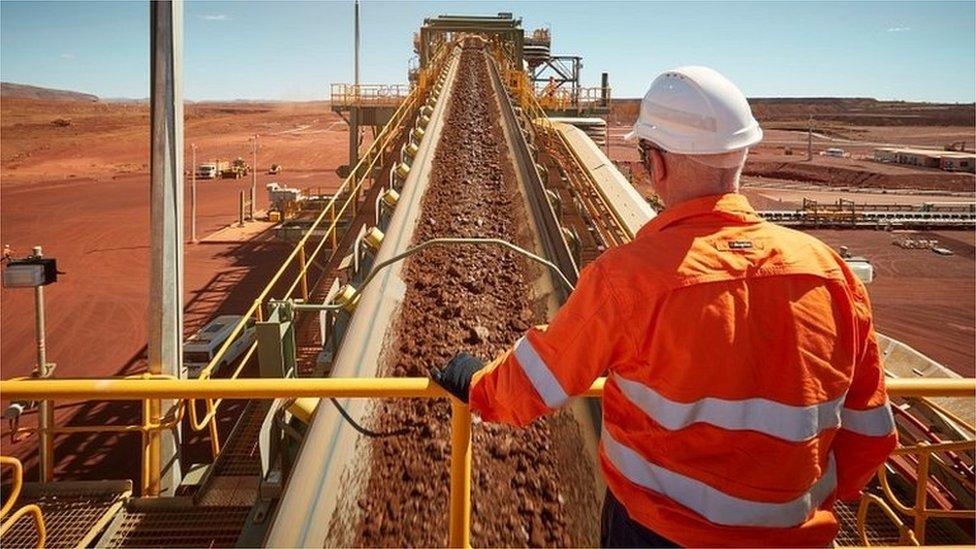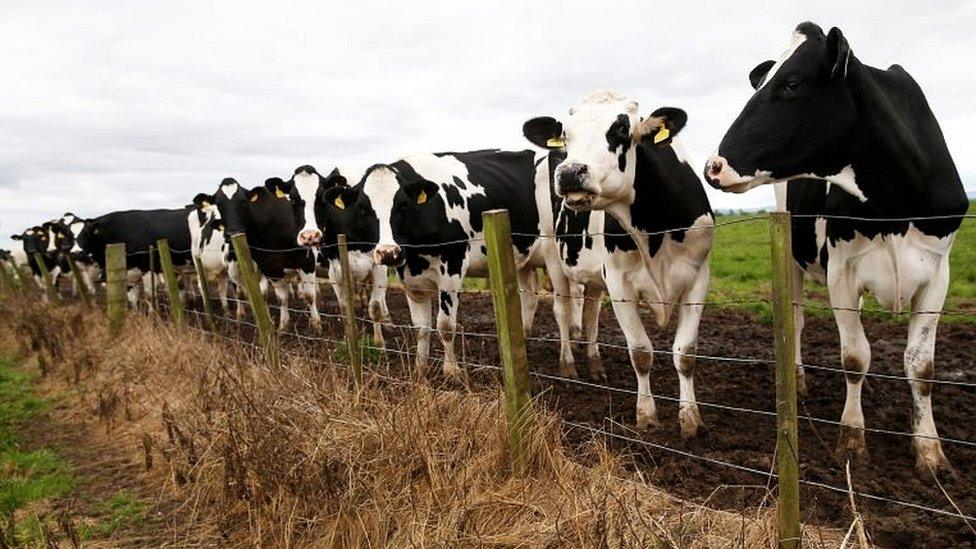UK makes free-trade offer to Australia despite farmers' fears
- Published

Australia's mining industry is a major driver of exports to the UK
The UK has offered trade deal terms to Australia under which both countries would phase out taxes on imports over 15 years.
The cabinet was reportedly split on what terms to propose, amid concerns UK beef and lamb farmers could be undercut by larger Australian producers.
But the dispute was apparently resolved after Boris Johnson pushed for unity.
International Trade Secretary Liz Truss formally made the UK offer to her Australian counterpart on Friday.
If accepted, it would also lead to quotas - limits - on tax-free trade between the two countries to be phased out.
The National Farmers' Union (NFU) has warned that freeing up the UK-Australian trade in meat will lead to hundreds of British cow and sheep breeders going out of business.
Ministers are keen to strike as many trade deals as possible following Brexit, and Ms Truss wants one in place with Australia by the time the UK hosts the G7 summit - of leading economies - in June.
But she had reportedly been at odds with Environment Secretary George Eustice over the possible impact on farmers of removing import taxes, called tariffs, that are normally paid to the government.
With these differences seemingly resolved at a Downing Street meeting chaired by the prime minister on Thursday, Ms Truss put the UK's terms for a deal to Australian counterpart Dan Tehan at an online meeting on Friday.
Speaking on a visit to Portsmouth, Mr Johnson said: "We are certainly looking at doing free trade deals around the world.
"They present a fantastic opportunity for our farmers, for businesses of all kinds, for our manufacturers. We should see these new openings not as threats but as opportunities."
Mr Tehan said he was "confident" of reaching an agreement with the UK by early June, having had "very positive discussions" with Ms Truss, the news.com.au website, external reported.

Farmers have raised concerns over competition from larger-scale Australian operators
In 2019-20, trade in goods and services between Australia and the UK was valued at £20.1bn,, external and both sides are hoping to expand this amount considerably.
Currently, metals, wine and machines, external form the biggest goods exports from Australia to the UK, while Australia's main UK imports, external are cars, medicines and alcoholic drinks.
Trade in meat between the two countries is small, with 0.15% of all Australian beef exports going to the UK and 14% of sheep meat imports to the UK coming from Australia.
NFU president Minette Batters said removing tariffs on these products would "have a massive impact" on British farms, which would be unable to compete, in terms of scale, with Australia's vast cattle and sheep stations.
She added: "We continue to maintain that a tariff-free trade deal with Australia will jeopardise our own farming industry and will cause the demise of many, many beef and sheep farms throughout the UK. This is true whether tariffs are dropped immediately or in 15 years' time."
'Distinct advantages'
The Scottish and Welsh governments have both urged Mr Johnson to ensure UK farmers are not left exposed.
And Northern Ireland's agriculture minister, Edwin Poots, said he was "strongly opposed" to ending tariffs and quotas.
But Conservative MP Neil Parish, chairman of the Commons Environment, Food and Rural Affairs Committee, said UK farmers could succeed in the beef market by exporting more "higher-end" cuts, such as sirloin, to Australia.
A Department for International Trade spokesperson said: "Any deal we sign with Australia will include protections for the agriculture industry and will not undercut UK farmers or compromise our high standards.
"Typically, any tariff liberalisation is staged over time, with safeguards built in. We will continue to work with the industry, keeping them involved throughout the process and helping it capture the full benefits of trade."

Are you a farmer in the UK? What are your thoughts on a free-trade deal? Share your experiences by emailing haveyoursay@bbc.co.uk, external.
Please include a contact number if you are willing to speak to a BBC journalist. You can also get in touch in the following ways:
WhatsApp: +44 7756 165803
Tweet: @BBC_HaveYourSay, external
Please read our terms & conditions and privacy policy
If you are reading this page and can't see the form you will need to visit the mobile version of the BBC website to submit your question or comment or you can email us at HaveYourSay@bbc.co.uk, external. Please include your name, age and location with any submission.